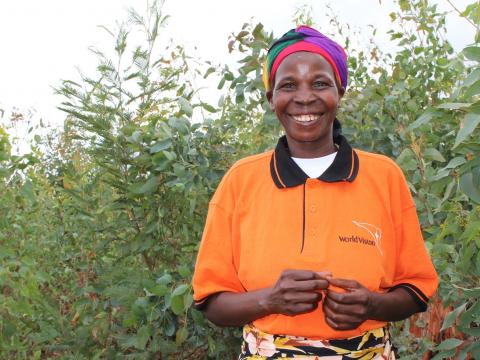One woman making a difference: protecting her environment

Ditches are starting to cut across the hills of Burundi. They look pretty, but are not for esthetic reasons. Erosion is a big problem in this tiny, hilly nation already hit by alarming levels of hunger (1), and still struggling for normalcy after decades of war.
Disaster risk reduction activities, therefore, including prevention of soil erosion are important. ‘We start small,’ says Judith Ntamahungiro, a World Vision volunteer and one of the150 DRR Train the Trainers from Gashoho ADP, close to the Tanzanian border. ‘We gather up to 50 people at one time, and talk about the problems they are facing. We share ideas about how they can protect their land. We meet on the hills, and we dig ditches, or plant trees, which protect the hills from erosion.’
Judith is a small lady with big, bright eyes. They light up as she speaks, and her passion for her community, for the environment is obvious in everything she says.
Apart from being a WV volunteer, she is also chief of her hill (2). There are 28 chiefs in her region, two of them women. How did she become one of them? She says that her work with WV has brought her closer to the community, that it has helped her earn their respect and vote. Twice. This is her second term as chief of her hill. She ponders for a minute or two, smiling: ‘You made me remember all the things I’ve done. Thank you. There are many things I am happy and grateful about.’
And so is Helmenegilde Mduwimana. A refugee for over twenty years, homeless, landless in Rwanda, then in Congo, he now has over four hectares of land, growing vegetables, fruits. And also eucalyptus trees, good for preventing soil erosion. After taking part in the WV DRR training with Judith, he started a eucalyptus nursery. ‘The training sparkled my mind,’ he says. Six months later, he has 10,000 eucalyptus seedlings, ready for planting. His aim? 37,500 seedlings by end of the year.
To encourage such intiatives, WV bought 2,000 of the seedlings and distributed them to farmers on IDRR day.
‘We truly are an ideas making organisation,’ says Augustin Mbonyumwitsa, Development Facilitator, Gashoho ADP, lauding Helmenegilde’s initiative.
The DRR project is funded through the generous support of Australian donors. Up to now, more than 2,000 children and 1,000 adults received training on disaster risks measures part of this project.
For photos related to this story, click here
(1) Burundi tops the list of 20 countries with alarming levels of hunger in this year’s Global Hunger Index http://www.ifpri.org/ghi/2012
(2) Administration unit